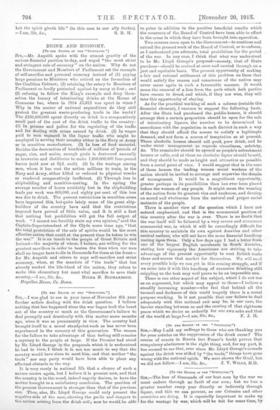DRINK AND ECONOMY.
[To TUE Barite OP TEE "SPECTATOR.") SIR,-Mr. Asquith spoke with the utmost gravity of the serious financial position to-day, and urged "the most strict and stringent rule of economy" on the nation. Why do not the Government and Members of Parliament set the example of self-sacrifice and personal economy instead of (1) paying large pensions to Ministers who retired on the formation of the Coalition Cabinet; (2) retaining the salary to Members of Parliament so loudly protested against by many at first ; and (3) refusing to follow the King's example and deny them- selves the luxury of intoxicating drinks at the House of Commons bar, where in 1914 £5,612 was spent in wines P Why in the matter of national expenditure do they still protect the greatest waste-producing trade in the world ? The £160,000,000 spent directly on drink is a comparatively small part of the cost of the drink traffic to the country : (1) In prisons and police for the regulating of the traffic and for dealing with crime caused by drink. (2) In wages paid to men engaged in the liquor traffic who might be employed in serving their country either in the Navy or Army or in munition manufacture. (3) In loss of food material. Besides the destruction of hundreds of millions of 'pounds of sugar, rice, and !maize, enough grain is destroyed annually in breweries and distilleries to make 1.000,000,000 four-pound loaves (sold now at Sid. each). (4) In the wastage among men, whom it has cost the nation millions to train, in the Navy and Army, either killed or reduced to physical wrecks or rendered comparatively inefficient. (5) Through loss in shipbuilding and munition-making. In the spring the average number of hours avoidably lost in the shipbuilding trade per week was 668,000, and eighty per cent. of this loss was due to drink. The present restrictions in munition areas have improved this, but quite lately some of the great ship- builders of the country have said that the restrictions imposed have proved of little value, and it is still a fact that nothing but prohibition will get the full output of work. " I cannot too forcibly state my own opinion," said the Captain-Superintendent of the Clyde some time ago, "that the total prohibition of the sale of spirits would be the most effective action that could at the present time be taken to win the war." It is an instat to the people of Great Britain and Ireland—the majority of whom, I believe, are willing for the greatest sacrifices in order to hasten the time when our men shall no longer have to die in thousands for them at the front— for Mr. Asquith and others to urge self-sacrifice and strict economy, when, at the mandate of "the trade" that has already sucked the life-blood of the nation, they refuse to make this elementary but most vital sacrifice to save their














































 Previous page
Previous page